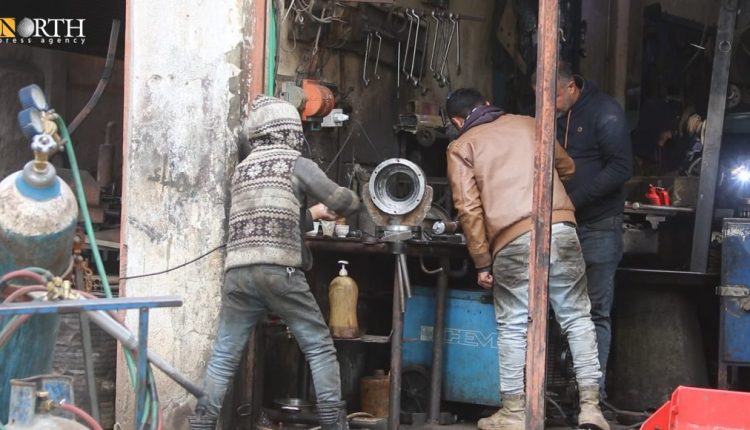
By Dilsoz Youssef
QAMISHLI, Syria (North Press) – In Qamishli’s industrial zone in northeast Syria, workshop and factory owners are compelled to purchase fuel at exorbitant prices, which is needed to operate generators and obtain electricity after power stations were destroyed and rendered out of service due to Turkish shelling.
Turkish forces launched intensive attacks using warplanes and drones for five consecutive days on northern and northeastern Syria, starting on January 12, targeting vital infrastructure and service facilities.
These attacks disrupted the production of oil and gas, in addition to causing water shortages and the suspension of some hospitals and mills. Six people were injured in the attacks, according to a statement by the Autonomous Administration of North and East Syria (AANES).
Taha Omar, an employee at detergent factory in the city of Qamishli, told North Press that work has been hindered due to the lack of fuel needed to run the generator and machinery.
“Sometimes, the factory runs out of fuel, which causes significant disruptions to our machinery resulting in substantial losses,” he told North Press.
Complete power outage
The city of Qamishli used to experience long hours of power rationing, reaching around 20 hours per day before the Turkish attacks. Currently, the power supply has been completely cut off after the Sweidiya power station, which used to provide gas and electricity to most of the Northeast Syria region, went out of service.
Turkish drones targeted with seven strikes the power plants in Kobani, Ain Issa, Amuda, Tirbe Spiyeh (al-Qahtaniya), Qamishli, and Derbasiyah. As a result, these stations went out of service, according to statistics released by the AANES on Jan.15.
Turkey also carried out seven airstrikes on oil facilities. The targeted locations included the Sweidiya gas plant, the Awda oil field, the Taflah Refinery station, and another oil facility in the village of Gire Pire, near the town of Tirbe Spiyeh. Furthermore, warehouses used for oil field maintenance in northeastern Syria were also hit.
The detergent factory where Omar works used to receive around 4,000 liters of fuel per month. However, they are now obliged to purchase fuel from the black market at high prices.
Taha Omar emphasized that they are determined to resume work and ensure production continues smoothly.
“The high cost of fuel is negatively impacting us. We haven’t raised the prices yet, but if the situation persists, we may be forced to do so,” he added.
He noted that the factory is supporting 14 families, but if the work continues at this pace, there is a high likelihood that “we will have to lay off some workers.”
The industrial sector is a vital part of the economy in the AANES-held areas, providing employment opportunities for thousands of families in the midst of the country’s difficult living conditions.
Reduced allocations
The ongoing fuel crisis has resulted in the closure of several factories, while other factory owners have resorted to reducing working hours due to electricity outage.
The allocations for factory owners, numbering around 150 factories, used to amount to approximately 600,000 liters of diesel weekly. However, the quantity has currently decreased to a quarter of that, as stated by Akram Suleiman, the Deputy President of the AANES’s Union of Chambers of Industry.
“After Turkey targeted the oil facilities in Northeast Syria, some factories went out of services due to fuel shortages,” Suleiman told North Press.
He further explained that nearly a thousand industrial shops, which used to receive approximately 30,000 liters of fuel per week, have also lost their subsidies. As a result, they are now forced to purchase fuel from the black market at a significantly higher price of 4,300 SYP per liter. This price is twice the amount previously provided by the Union of Industry Chambers, which was 2,300 SYP per liter, to support the industrialists.
The industrialists in Qamishli are grappling with the increasingly urgent challenge of securing fuel. They face the looming possibility of shutting down their factories due to the unavailability of electricity and fuel, making these issues a pressing concern for them.
Nashteh Khajadourian, an industrialist and workshop owner in Qamishli, highlighted in an interview with North Press that the fuel shortage has significantly impacted their work. This is because their workshop heavily relies on electricity for operations.
The Armenian craftsman highlighted how power outages create a backlog of work for them, prompting their customers to seek alternative shops that have uninterrupted access to electricity.
“This will adversely affect the citizens, as owners of industrial facilities, we will be forced to raise prices and double them, since we are purchasing fuel at high prices,” he concluded.
